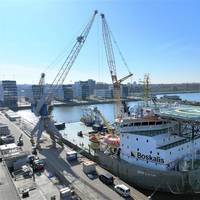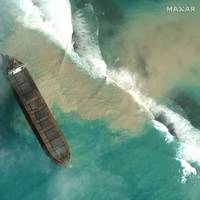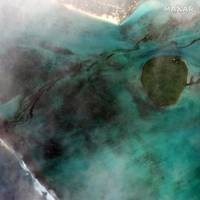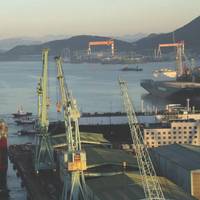IMO Asks States for Equipment for FSO Safer Oil Spill Contingency Plan

The IMO is urging Member States to contribute equipment to help UN-led efforts to prevent a possible catastrophic oil spill from the FSO Safer, an ageing and rapidly decaying floating storage offshore (FSO) unit moored 4.8 nautical miles off the Red Sea coast of Yemen.A converted super tanker, the FSO Safer contains an estimated 150,000 metric tonnes (approximately 1.1 million barrels) of crude oil, four times the amount spilled during the Exxon Valdez incident in 1989. It has been moored at Ras Isa since 1988 where it had been receiving…
Wakashio Spill Highlights Importance of Adopting Latest International Legal Instruments

The ongoing oil pollution incident from the grounded 203,000 DWT bulk carrier MV Wakashio is threatening an ecological catastrophe around the Indian Ocean island of Mauritius, endangering corals, fish and other marine life already under threat from climate change (IPCC 2018).In addition, it risks bringing devastating consequences for the economy, food security, health and tourism industry. Tourism in Mauritius - a popular destination for its pristine beaches - reportedly contributed about $1.6 billion to its economy during the last year…
Op/Ed: Government Response Should be Investigated After Wakashio Spill

The stranding of the MV Wakashio is one of the biggest environmental disasters in the history of the western Indian Ocean. While the full scale of the disaster is not yet known, the 1,000 tons of oil and diesel that leaked close to one of the greatest marine treasures of Mauritius threatens to destroy this precious habitat. Recovery will be long and the disaster will occupy Mauritius for years to come.Questions now arise: could the accident and the spill have been prevented? Was the country prepared?
Viet Nam Readies for Oil Spill Contingency
Work is underway to further develop Viet Nam’s national oil spill contingency plan at a workshop in Ho Chi Minh City, Viet Nam, this week (26-29 November).Forty participants from across 10 government departments and the oil and gas and shipping industry are taking part in the workshop, which is the latest in a series of International Maritime Organization (IMO)-assisted events on oil spill contingency in South-East Asia.Participants are being introduced to international good practices and developments in the field of oil spill preparedness and response – and supported to identify areas for improvement in Viet Nam’s existing national framework.An action plan to finalize the draft National Oil Spill Contingency Plan will be agreed.Accession to IMO’s Oil Pollution Preparedness…
Thailand Prepapres for Oil Spill
Supporting countries to prepare for contingencies is an important part of International Maritime Organization (IMO) 's capacity building work.Thailand is the latest country to benefit from IMO assistance to update its oil spill contingency plan at a National Workshop on National Contingency in Bangkok (24-27 September).Thirty-five participants from 15 government entities and oil and gas companies learned about the latest international best practices, and developments, in the field of oil spill preparedness and response and identified areas of improvement in their existing national plan.The workshop was organized under the framework of the Global Initiative project for South East Asia (GI SEA), a joint project with the oil and gas industry (IPIECA).
SE Asia Plans Oil Spill Contingency
According to International Maritime Organization (IMO), one of the key elements in oil spill contingency planning is to define the communication channels to be used by cooperating parties when facing an incident.A workshop in Pulau Indah, Klang, Malaysia (19-21 August) has brought together officials from states in the Association of Southeast Asian Nations (ASEAN), to help bring into operation the Regional Oil Spill Contingency Plan, which was adopted in 2018.Participants from nine countries got to grips with key elements of the plan and practiced communications between States, in order to identify any gaps and lessons to be learned.The workshop will help drive forward the implementation of this recently adopted plan…
Cambodia Readies with Oil Spill Preparedness
Supporting countries to prepare for contingencies is an important part of International Maritime Organization (IMO) 's capacity building work.According to the UN body, Cambodia is the latest country to benefit from IMO assistance to update its oil spill contingency plan, by identifying country-specific risks and existing gaps in order to be able to respond effectively to oil spill incidents.A national workshop in Phnom Penh, Cambodia (6-9 August) has brought together 60 participants from 20 government entities and oil companies.Attendees received an overview of the international framework for oil spill preparedness and response and are…
Oil Spill Response Training at Montenegro
The Regional Marine Pollution Emergency Response Centre for the Mediterranean Sea (REMPEC), the IMO-administered pollution emergency response centre in the Mediterranean, has delivered a national training course in oil spill response in Montenegro.International Maritime Organization (IMO) said in a press release that the course was designed to prepare the competent national authorities to co-ordinate and manage responses and make decisions on strategies and tactics to be used in clean-up operations.It was aimed at supervisors and on-scene commanders, the release said.The training course will help Montenegro implement the International Convention on Oil Pollution Preparedness…
ASEAN Adopts Oil Spill Contingency Plan
International Maritime Organization (IMO) technical assistance and institutional support has been instrumental in the recent adoption of the Association of Southeast Asian Nations (ASEAN) Regional Oil Spill Contingency Plan.IMO said that the plan was adopted by the 24th ASEAN Transport Ministers Meeting, held in Bangkok, Thailand (8 November). The Regional Oil Spill Contingency Plan provides for a mechanism whereby ASEAN Member States can request and provide mutual support in response to any oil spills.It also ensures a common understanding and effective integration between affected and assisting ASEAN Member States, in the event of incidents involving oil spills…
Myanmar's Oil Spill Preparedness
Myanmar is the latest country to benefit from International Maritime Organization (IMO)’s work to enhance marine oil spill preparedness and response in the ASEAN region.A press note from the UN agency informed that a training course for senior officials and members of the national oil spill management team is taking place in Yangon, Myanmar (12-14 November).The training is focused on the effective response to oil spills, including on both managing risks from shipping and incident management. It builds on on-going efforts by the Myanmar National Task Force for the development of the National Oil Spill Contingency Plan, which is reaching finalization.The training course coincides with the completion of the plan…
ASEAN Members Strengthen Oil Spill Preparedness
Oil spill contingency planning is in the spotlight at an IMO regional workshop in Pulau Indah, Malaysia (2-6 July). The workshop is helping countries (ASEAN Member States: Cambodia, Indonesia, Lao PDR, Malaysia, Myanmar, Thailand, Vietnam and Singapore.) in South East Asia become more familiar with the ASEAN Regional Oil Spill Contingency Plan - designed to enhance cooperation between States. Participants are reviewing a number of aspects of the plan and exercising its communication procedures. IMO has long supported regional cooperation and capacity building in oil spill preparedness and response, including through a joint project with the oil and gas industry – the Global Initiative project for South East Asia (GI SEA).
Oil Spill Response in Equatorial Guinea
Emergency preparedness and response in the oil and gas sector was at the core of a workshop held in Malabo, Equatorial Guinea (7-10 May). The aim of the workshop was to strengthen the country's capacity to prepare for and respond to marine pollution from oil spills. This workshop follows on from a series of events developed with the Republic of Equatorial Guinea with a view to making recommendations to improve the national preparedness and response system in the country, including a more robust national oil spill contingency plan. The course also focused on the International Convention on Oil Pollution Preparedness, Response and Co-operation (OPRC), which deals with pollution incidents, either nationally or in cooperation with other countries.
Cooperation for Oil Spill Preparedness in Africa
A regional conference of countries in west, central and southern Africa has committed to continue to work at both national and regional levels to boost preparedness to deal with oil spill incidents which could be devastating both for the marine environment and financially. The conference (6-9 November) in Abidjan, Côte d'Ivoire, was hosted by CIAPOL, the Ivoirian pollution control centre. It brought together industry and government focal points from 20 out of 22 west, central and southern African countries covered by the Global Initiative for West, Central and Southern Africa (GI-WACAF). This project is run by the International Maritime Organization (IMO)…
Oil Spill Training Exercise in West Africa
A tanker collides with an unknown ship off the Ivorian coast, causing a major oil spill. This was the scenario of an oil spill training exercise that took place in Abidjan and Assinie, Côte d’Ivoire (8-9 June). The deployment exercise involved more than 100 participants from various public institutions and the private sector, working together to fight the simulated spill, first at sea and then ashore. The event tested Côte d’Ivoire’s National Oil Spill Contingency Plan, which has been developed over recent years with support from the Global Initiative for West, Central and Southern Africa (GI WACAF) – a joint IMO-IPIECA project. Following the training…
FLNG Prelude: A New Dawn in the Age of Maritime & Energy

Longer than four football fields, as big as six Nimitz-class aircraft carriers and almost as tall as the Taipei 101 skyscraper, Royal Dutch Shell PLC is hoping that its record-setting, game-changing floating liquid natural gas (FLNG) facility will serve as a prelude to a killing in the offshore LNG market. It’s not alone. Many industry observers believe FLNG will do for gas offshore what fracking has done for shale or natural gas trapped in the ground on shore. “This is revolutionary technology …[that]… has the potential to change the way we produce natural gas…
Steamship Mutual: US Vessel Response Plans – Contingency Plans
Washington State – Alaska – Non tank final rule & Washington State – Contingency Plan requirements. We refer to our circular no. B.613. As stated in that circular, every tank vessel and every other vessel over 300 GT is required under State law to file a contingency plan prior to entry into the waters of Washington State but that instead of filing his own plan an owner can subscribe to an umbrella oil spill contingency plan. Since publishing the abovementioned circular, Washington State Maritime Co-operative (WSMC) has changed its enrolment agreement and the version with footer “WSMC Enrolment Agreement – December 2013” conforms with the International Group’s guidelines on vessel response plans.
Arctic Oil Spill Contingency Plan Devised by Students

DNV’s summer students present results of work to develop a realistic concept for a year-round Arctic oil spill response system. The Norwegian students' project included requirements for people, vessels and equipment. DNV’s summer project is an annual programme organised during the summer months for students in their final year of a master’s degree programme. This year, ten students with varied cultural and academic backgrounds worked intensely on their project for seven weeks. The focus has been on developing an Arctic oil spill response system.
Legal Matters
Senator Slade Gorton (R-Wash.) introduced the "States Prevention of Oil Tanker Spills Act" (S. 2506), which seeks to reinstate Washington state oil tanker safety laws overturned by the Supreme Court in Intertanko v. Locke and United States v. Locke. In a press release, Senator Gorton said, "I disagree with the Court's decision, because I believe Washington State should be allowed to protect its shores as it sees fit." The Gorton legislation would reinstate the right of all states to adopt additional standards beyond existing federal requirements governing the operation, maintenance, equipment, personnel and manning of oil tankers. While the legislation would apply to all coastal states, Gorton's interest is focused on recently overturned Washington statutes.
Washington State New Contingency Plan Rules Proposed
The Washington State Department of Ecology released proposed Oil Spill Contingency Plan Regulations. The proposed rules would totally replace the current ones and are intended to ensure that ship owners and operators and oil handling facilities demonstrate they can quickly and effectively respond to oil spills. The proposed rule focuses on early spill response actions, staging response equipment throughout the state, and conducting scheduled and unannounced spill readiness drills. The Preliminary Cost Benefit Analysis estimates the annual cost of the proposed rule to be $6.8 million. Compliance benefits are estimated to be in the range of $20 million to $159 million (that is a large range and it assumes that these proposed rules would prevent an Exxon Valdez-type spill).
Ecology Proposes Spill Prevention and Response Readiness Rules
Washington waters and to improve response readiness. trucks and rail cars. facility and vessel operators who transfer oil to or from vessels. practices to prevent spills. required to deploy oil-spill containment boom prior to transferring oil. activities. that they can mount an effective, timely response if they spill oil. spill readiness drills.
Washington State- New Oil Spill Prevention and Response Rules
The Washington State Department of Ecology issued amendments to its regulations regarding oil spill prevention and response. The oil spill contingency plan rules are being revised to require companies to demonstrate that they can rapidly mount an effective response if oil is spilled. The facility oil handling standards and the vessel oil transfer advance notice and containment requirements are being revised to require, among other things, placement of oil spill containment boom around barges, ships, and other vessels when they are delivering or taking on oil. All recreational boats are exempt. The changes come into effect on October 26. source: HK Law
ConocoPhillips to Pay Fine for 2004 Spill
The owner of the Polar Texas - the oil tanker that spilled more than 1,000 gallons of crude oil into Puget Sound's Dalco Passage on Oct. 13, 2004 - will pay in full a $540,000 fine levied by the Washington Department of Ecology (Ecology). The ship - which has since been decommissioned - belonged to Polar Tankers, Inc., a subsidiary of ConocoPhillips Co. The $540,000 fine is the largest fine Ecology has ever issued for a spill in marine waters, and is the maximum possible penalty under state law. Negotiations continue, meanwhile, on a state-federal-tribal damage assessment that is separate from the penalty. Funds from this assessment would be placed in a fund that supports restoration projects that compensate Washington citizens for damage to the public's environmental resources.
Ship Fined for Failure to Have Oil Spill Readiness Plan
The Washington Department of Ecology (Ecology) has levied an $8,500 fine to the Greek shipping firm Marmaras Navigation Co. Ltd. for operating a cargo vessel in Washington waters without a state-approved oil spill readiness plan. The penalty against Marmaras Navigation marks the first time Ecology has levied a fine under its new oil spill contingency plan rule adopted in October 2006. Ecology requires that cargo and passenger ships, tank vessels, oil storage facilities and pipeline companies demonstrate that they can mount an effective, timely response if they spill oil. Under the rule, the vessel must either have their own approved spill readiness plan or be enrolled in one of the two non-profit organizations with approved plans that cover vessels in Washington.





